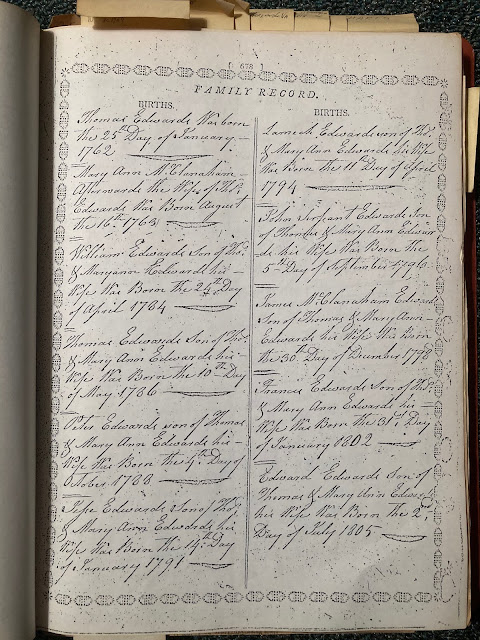How to Spot a Red Flag in Colonial American Genealogy
I
see this stuff over and over again in public trees, posted and
re-posted by the thousands. If there's anyone pulling their hair out
over these things, here's some red flags to look for that will strongly
suggest you're looking at weak research:
- People in the 17th and 18th centuries with middle names. Yes, some people did have them. But most didn't. Bad genealogists seem to love adding middle names to their colonial ancestors, even if no middle name appears in any record for the individual. Evidently, if they find records of people that are confusing or inconsistent--one guy is named William Smith and another guy from someone else's genealogy with the same wife is named Robert Smith--they will simply add the new first name as a middle name: William Robert Smith. VOILA. Problem solved!
- People in the 17th and 18th centuries with birth and death dates. This mostly pertains to the colonial south, where parish records are few and far between. During this era, most of what you'll be working with is government papers--court records, wills, probate, tithables lists, jury lists, etc. Not too many birth and death dates recorded back then, unless you're in New England. If you see a whole lineage of 18th century people with middle names, maiden names, birth and death dates, run the other way, screaming and warning others if possible.
- Extensive, complete colonial genealogies with no sources. I started poking through one southern colonial family I hadn't really messed with much and quickly realized that all of the (bad) research came from a single source-- a book written in 2005. When I found the book on SCRIBD, I realized it wasn't even a book. It was just a collection of printed family group sheets with NO SOURCES. NONE. Not a single deed or will. Not even a witness. And this was the primary source for almost every tree on the internet for this family. I can't. I just can't.
- People who had their first child at 9. Or their last at 75. Another case of genealogists being sloppy. This seems silly to even write, I know! It still mystifies me how this gets by thousands upon thousands of people. I even had one lady thrown down caps lock one me when I pointed this out to her.
- Anything at all involving heraldry, family crests, famous ancestors, royalty or unclaimed property. Inheritance scams were common in the 19th century, just as genealogy was catching fire and people were publishing all kinds of badly researched or straight-up fabricated family histories. I've seen three of them now in my lineage, including one scam that went on for 120 years, across three or four generations of scammers. For some reason, this stuff still seems to get older folks, usually the type that will dead ass binge "Ancient Aliens" on the History Channel.
- Findagrave.com. This whole site is a huge red flag for colonial genealogy. People will add their colonial-era ancestors with no gravestone, record, nothing. Often, they will add a probate date as though it were a death date. Sometimes they will even make up a cemetery. If there's no stone, leave it alone!
I'm going to
be honest. Most people aren't good at this. But you are. Because you're
on the internet reading a post about how to be a better genealogist, which means you actually care and want to learn
about the hobby and find the truth about your own history. Stay sharp
out there!



This comment has been removed by the author.
ReplyDeleteThanks for your effort in correcting errors and hopefully guide people in the right direction. I found your blog while on my own journey through the Edwards tree and hopefully will be able to make some sense of it.
DeleteThanks for reading!
Delete